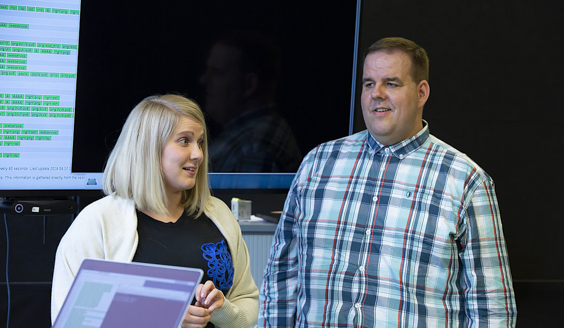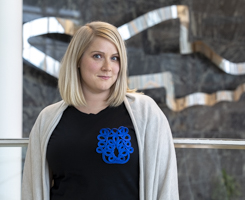Competent reservists are an important part of cyber defence
The Defence Forces needs skilled reservists in the development of cyber defence. Refresher training for reservists has been carried out this week in connection with the largest and most complex international live-fire cyber defence exercise in the world, Locked Shields 2018.

In addition to the joint Finnish-Swedish detachment, the Defence Forces also established a national exercise detachment mainly composed of reservists. The team also includes cyber experts of the Defence Forces’ partners in cooperation who participate through the National Defence Training Association’s special course in cyber security.
The exercise supports the development of know-how of both the Defence Forces and partners. Participants include top level experts in cyber security.
Participation in this exercise feels meaningful
A motivated and versatile reserve is an important part of cyber defence as well as of society’s overall security. The Defence Forces also need to include cyber-oriented women among their troops.
"Most people in the field are still men, but during the three years that I have been involved in student selections, the number of women has been increasing", says Hilkka Grahn who works as a teacher at the University of Jyväskylä, and is one of the women working with cyber security.
 Hilkka is participating in Locked Shields for the first time. In the exercise, and also in general in protecting society from cyber attacks, people with other skills than cyber know-how are also needed. "I can translate technical language into everyday language. I can keep track of many things and have the situation under control. I am also good at organising and prioritising," Hilkka Grahn says when asked what skills she can bring to the Defence Forces.
Hilkka is participating in Locked Shields for the first time. In the exercise, and also in general in protecting society from cyber attacks, people with other skills than cyber know-how are also needed. "I can translate technical language into everyday language. I can keep track of many things and have the situation under control. I am also good at organising and prioritising," Hilkka Grahn says when asked what skills she can bring to the Defence Forces.
She is part of the reporting team that is responsible for producing situational awareness. Based on the work of the technical experts, the team produces information and reports to support the decision-making of the leadership.
"Ours is an important task; we produce information based on which the exercise’s fictional society can function", Hilkka explains.
Hilkka feels that the exercise is significant from the point of view of her own work.
"I learn to better understand technology and the cyber field in general. I gain more information on actors in the field, I get to meet new faces, deepen cooperation and cross organisational borders. I want to know which different actors belong to the field and what mandates they have. This is a unique opportunity, not everyone gets the chance to participate. As a university employee, it feels great to be able to be part of this kind of international exercise. It is also nice that even if you haven’t undergone military service - you can be part of the cyber defence and see what the world inside the Defence Forces is like.
The cyber field challenges you to keep learning
The participation of university staff in the exercise is important also because this contributes to the development of cyber security training programmes. This way, the best experts are trained for the cyber units of the Defence Forces and other organisations. Cyber defence and security is an important profession and it challenges its practitioners to continue learning.
"The Defence Forces are continuously abreast of the times in the field, and students have noticed the vacant positions within the Defence Forces. To the public in general, the Defence Forces’ cyber activities seem mystical and this also makes people interested in such tasks", Hilkka says.
 Senior Lecturer Panu Moilanen from the Faculty of Information Technology of the University of Jyväskylä is responsible for developing curricula in the field; "By participating in exercises, I see what should be taught more in depth and what needs only to be mentioned. There is interest in the field - applicant numbers have increased by up to 75% in the last years."
Senior Lecturer Panu Moilanen from the Faculty of Information Technology of the University of Jyväskylä is responsible for developing curricula in the field; "By participating in exercises, I see what should be taught more in depth and what needs only to be mentioned. There is interest in the field - applicant numbers have increased by up to 75% in the last years."
"I am responsible for the study entity information influence, the cyber security master’s programme at operational level and interest group cooperation. I am a member of the National Defence Training Association’s working group for developing cyber security training. The cyber security field and my job are extremely interesting; I get to do new things all the time."
Playing the game carries you along
Panu participated in the exercise already last year, when the reservist detachment was formed for the first time. This year, like Hilkka, he is in the reporting team. With his know-how in information system science, marketing and communications, he brings valuable experience to the Defence Forces and the exercise.
"I understand how many technical things work and what consequences they have. When know-how is not limited only to bit-level, I can translate cyber language into more understandable terms and report to the fictional decision-makers in accordance with my task in the exercise."
How does Panu himself benefit from the exercise?
"Of course the exercise develops and deepens also my own know-how and I gain new experience. I see the technology from a closer perspective and participation is also important from the point of view of society. Being a part of the exercise is really fun; it doesn’t feel at all like work! Playing the game can really carry you along. We have a really good and knowledgeable team; I haven’t been able to find a single flaw yet".
By participating in LS18 and the activities of the National Defence Training Association of Finland, Panu is able to strengthen his national network connections.
Cyber defence needs both men and women
The reservists and National Defence Training Association course participants have not needed much motivating from the Defence Forces. Cyber defence and developing one’s own know-how is seen as important.
"You are motivated already just by being invited to join the team", Panu and Hilkka agree.
According to Panu, you can see that cyber defence is starting to interest women more. In the field, women and men are equal - women can be found doing the most extreme bit-related tasks as well as tasks that require communication skills and observation.
"In cyber security you need different perspectives and means of observing, men and women may notice and pay attention to different aspects. Hilkka for example has bravely thrown herself into the cyber field and learned terminology. It is good that she is able to participate in the exercise and gain experience that extends her range of knowledge. As a cognitive scientist she can give the field a lot of support also in the future", Panu praises his colleague.
Read more about Locked Shields.



